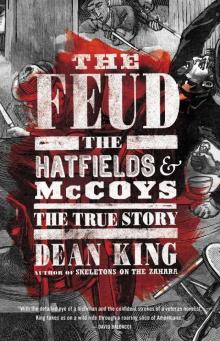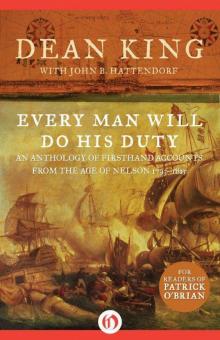Every Man Will Do His Duty Read online
Page 5
The French fleet had their maintopsails to the mast, and were waiting for our attack. Shortly after 9 o’clock we were getting very near to our opponents. Up went their lower deck ports, out came the guns, and the fire on us commenced from several of the enemy’s van ships. Twysden then went to his quarters on the main deck, and your humble servant went below to his station. We retained our fire till in the act of passing under the Frenchman’s stern, then, throwing all our topsails aback, luffed up and poured in a most destructive broadside. We heard most distinctly our shot striking the hull of the enemy. The carved work over his stern was shattered to pieces. Then, ranging up alongside of him within half pistol shot distance, our fire was kept up with the most determined spirit. When we had measured our length with that of our adversary, we backed the maintopsail. In that position the action was maintained for some time. We had instructions below to lower the ports whilst loading the guns,16 that the enemy’s musketry might not tell upon our men, and also to fire with a slight elevation, as the upper deck guns would be depressed a few degrees, thus making a cross fire upon the Frenchman. After the two or three first broadsides, I became anxious to have a good view of the ship we were engaging. To effect this object, I requested the men at the foremost gun to allow me a few seconds, when the port was hauled up, to look out from it. They complied with my wishes. The gun being loaded, I took my station in the centre of the port; which being held up, I beheld our antagonist firing away at us in quick succession. The ship was painted a dark red, as most of the enemy’s fleet were, to denote (as previously mentioned) their sanguinary feelings against their adversaries. I had not enjoyed the sight long—only a few seconds—when a rolling sea came in and completely covered me. The tars, noticing this, instantly let down the port, but I got a regular soaking for my curiosity. The men cheered me, and laughingly said, “We hope, Sir, you will not receive further injury. It is rather warm work here below: the salt water will keep you cool.”
One of these, John Polly, of very short stature, remarked that he was so small the shot would all pass over him. The words had not been long out of his mouth when a shot cut his head right in two, leaving the tip of each ear remaining on the lower part of the cheek.
His sudden death created a sensation among his comrades, but the excitement of the moment soon changed those impressions to others of exertion. There was no withdrawing from our situation, and the only alternative was to face the danger with becoming firmness. The head of this unfortunate seaman was cut so horizontally that anyone looking at it would have supposed it had been done by the blow of an axe. His body was committed to the deep.
The action was kept up with the utmost determination. At ½ past 10 our mizen mast was shot away, and our ship drifted to leeward. Several of my men were wounded. Holmes, the Captain of one of the guns, a powerful fine fellow, had his arm carried away close to the shoulder. By this time it was evident that the French were getting the worst of it, as we were obliged to go over to the starboard side to defend ourselves against an enemy’s ship. At ½ past 11 the main mast came down on the starboard side of the poop with a terrible crash. This information was conveyed to us below by some of the seamen who had been in the tops. As they could no longer be useful in consequence of two of the masts being shot away, they were ordered down to the guns. They reported the upper end of the quarter deck to be dreadfully shattered. The lower deck was at times so completely filled with smoke that we could scarcely distinguish each other, and the guns were so heated that, when fired, they nearly kicked the upper deck beams. The metal became so hot that, fearing some accident, we reduced the quantity of powder, allowing also more time to elapse between the loading and firing of them.
One of the Captains of my guns was a Swede, by name John West. I noticed his backwardness, but before I could take any steps in his behalf, we had to change sides, a ship engaging us on our left. We had not been long occupied with her when we were called over to the right. After firing a broadside, John Lee, second captain of West’s gun, told me that he had deserted his quarters. “Why didn’t you knock him down?” I asked. “I did, Sir,” was the reply, “with this handspike,” showing it to me. However, West had absconded, and I was too much taken up with the pressing events of the moment to look after him. The ship we were engaging was very close, and the shot from him did us considerable injury. One of my guns was dismounted. This disaster created some confusion, more especially as the ship, from the loss of her masts, was rolling deeply; and we had considerable difficulty in securing the gun. Whilst we were occupied about this job, Lieut. Beecher thought that he observed a disinclination on the part of the seamen to exert themselves. All of a sudden he drew his sword from the scabbard, and began flourishing it about with threats that he would cut the first man down that did not do his duty. The tars were rather astonished at this proceeding of their officer as, hitherto, he had approved of their conduct. They had been fighting hard for upwards of two hours, and naturally were fatigued. They explained their anxiety to do their best. This pacified the heroic lieutenant. He sheathed his sword, and the men went on at the guns as before.
Just as this scene terminated, two of the men were blown down from the wind of a shot from the ship we were engaging, and I was carried away with them by the shock. I thought myself killed, as I became senseless, being jammed between these men. So soon as the smoke cleared away, our companions noticed my situation. They came, lugged me out, and began rubbing my limbs. This brought me to my senses. They lifted me up, enquiring if I felt myself hurt. I called out for water to drink. They handed to me a bowl with water. When I drank of it, it was quite salt. There were some saltbags hanging up close by, belonging to the men of that particular mess. These had been shot down, and had impregnated the water placed there to be used as required by those that were thirsty. Recovering myself, I felt considerable pain in my head and shoulders. My left cheek was cut by a splinter and bled profusely. I then examined the two men with whom I had been knocked down. In outward appearance they were dead; but as I did not consider myself a sufficient judge of these matters, I desired a couple of seamen to take them below to the surgeon. Whilst I was giving these directions, we were called over to the larboard side to repel the attack of an enemy. After a few broadsides he passed us. From him we received no injury at my quarters. Not long after, another Frenchman ranged up on the starboard side. Away we turned to, and pelted him as hard as we could. In crossing over I beheld the two wounded men still lying in the same position I had left them. Then, calling upon those to whom I had given orders to take the disabled men below, I insisted upon their immediately complying with my directions. They were then conveyed to the cockpit. After a few broadsides exchanged with our opponent, he made sail to leeward, and we had a few minutes’ rest. This gave me an opportunity of looking out of the ports, but there was not much to be seen from that low situation. All that we could make out, in our conjectures, led us to believe that the action was nearly over. We could plainly at times distinguish the French ships sailing off and forming to leeward, engaging our ships as they passed by.
We had not long been quiet, when we received orders from the quarterdeck for all hands to lie down, as an enemy three decker was coming to rake us. This ship closed gradually upon us with only her foremast standing, the sail of which enabled him to make way at a very slow pace. This was, to me, the most awful part of the battle. We could not defend ourselves from the stern, and here was an immense overpowering ship of upwards of 100 guns going to pour in her broadside into the weakest and most exposed part of our ship. It was a moment of extreme anxiety, as there was a chance of our being sunk. As he neared us there was an appearance of intending to board, and the boarders were called to repulse the attempt. But when he altered his course to rake, we were again ordered to lie down. We waited the coming event with a silent suspense not easily described. At length the enemy in passing across our stern, to our astonishment, only fired a few random shot, which brought down our disabled foremast. We were now compl
etely dismasted and quite unmanageable. The three decker, ranging up on our larboard side, gave us an opportunity of sending some well directed shot into him. In watching the motions of this ship, I noticed that the Frenchmen, in many instances, loaded their guns from the outside. One man I distinctly saw riding upon a lower deck gun, loading it. He was stripped from the waist upwards, and had we been sufficiently near, our marines could have picked him off with their muskets. This three decker soon got out of range, leaving us free of further molestation.
It was past 12 o’clock, and I concluded the fighting part of our duty to be at an end. My clothes were still damp: my shoes, to which I had small buckles, were covered with blood; my face and hands smutched with powder and blood. At my quarters I had 14 men killed and wounded (if I included myself I should say 15); and a gun. I now ascertained that no part of the lower deck had suffered so much as mine. On my way aft I shook hands with other mids who had escaped. Of these I shall never forget Ritchie. He was in his shirt upwards, with a bandage round his head. These were all bloody, and I thought he had been hurt. On my inquiring of him if it were the case, he gave me a hearty shake by the hand, telling me he was strong and hearty, and ready to continue the action when required. The bloody spots on his linen were occasioned by his having assisted some wounded men below. He gave the strongest symptoms of a bold and daring spirit, and had it not been for the bloody marks upon him, one might have supposed he had been at a merry and jovial party instead of a destructive battle. The next person I came in contact with was one of my messmates, Consitt. He also had taken off his coat and waistcoat, and his linen too was all bloody, which led me to suppose that he had been injured. However, upon enquiry, I found that he was safe and sound. In a few words he gave me an interesting account of what had been going on upon the quarter deck, as he was one of the Captain’s aides-de-camp. He had been sent down to the lower deck to ascertain its state and condition. Among the informations received from him, he stated that the Royal Sovereign, one of our three deckers, had fired into us and wounded some of our men. Upon further inquiry his assertion turned out to be true.
I now hastened up to the quarter deck. In attempting to do so I was prevented by the splinter netting which, from its lying across the quarter deck under the mainmast, had turned the place into a sort of cage. There was no getting on it until the netting had been cut away. Whilst on the ladder, Mr. Hawtayne, the clergyman, came to me. From my appearance he thought that I had been seriously injured, but I soon set his mind at rest on that subject. Leaving him, I at length reached the poop, where I met my Captain. He noticed me very kindly, and in replying to his questions I related to him what had happened at my quarters. Whilst in conversation with him, the second lieutenant, Mr. Dickson,17 began firing some of the starboard main deck guns. He was drunk. By this rash act he set the ship on fire, as the foretopsail was lying over the side. But in due time the fire was extinguished, and our alarms at an end.
The cannonade of the hostile fleets had lulled the wind, but the swell of the sea was still paramount, and our ship, without sails or masts to balance her motion, laboured in a most annoying manner. The first object that attracted my notice on the quarter deck was the immense quantity of the enemy’s musket shot lying there. On the starboard side, which had at the commencement of the action been the lee one, they were at least three or four tier deep, and the rest of the deck completely covered with them.18 How could it be possible, thought I, for anyone to escape being hit where so many thousand instruments of death had fallen? But so it was; and the Captain, with many of those around him, came off without injury. The only officers of the ship that were killed were the master, Webster, and the boatswain, Mr. Fitzpatrick. Lieut. Boycott of the 2nd Regiment, Queen’s, was severely wounded. He was a remarkably fine young man. The effect of his wounds obliged him to quit the ship upon our arrival at Spithead, to the regret of all who knew him. Looking around me, I saw the Queen, 98, some distance to leeward of us, still engaged with the enemy’s ships which had formed a line on the starboard tack. That ship had lost her main mast, but it soon became evident that she would rejoin us, and there was no apprehension on her account. But the Brunswick, 74, was to leeward of the French, and we were uneasy about her fate.19 She had lost her mizen mast. By one o’clock all firing was at an end.
The next thing to be done was to attend to the disabled ships. We made the signal for assistance from the stump of our mizen mast. In clearing away the lumber on the poop, a marine was found stowed away under the hen coops. Those who lugged him out thought him dead. However, he soon came to life. This was the Fugleman20 of that Corps, one of the finest limbed men I ever beheld, and the most perfect in his exercise. All hands laughed at him when they saw he had not been hurt. He was, also, like my friend West, a foreigner.
There was no walking the quarter deck till the small shot had been cleared away. The next object of consequence was to get rid of the main mast, which with some difficulty was finally rolled overboard. The quantity of damaged spars, with rigging, that was floating about gave proofs of the severity of the contest in which we had been engaged. The Queen Charlotte, Lord Howe’s flagship, passed close to leeward of us. She had lost all her topmasts, which prevented his following the French admiral. We gave his Lordship three hearty cheers, at which moment, we were afterwards told, Lord Howe observed, “If every ship of the fleet had followed Capt. Gambler’s example, the result of this action would have been very different from what it is.” The flagship having stood on a little while longer, signals were made to form on the starboard tack. While these things were passing, an opinion existed on board of us that the action would be renewed, as it became clear that the French were fairly beaten.
But that signal was not made. There were 14 sail of the line dismasted, 12 French and two English—ourselves and the Marlborough, 74,Capt. the Hon. George Berkeley.21 Capt. Gambier, giving me his spy glass (which had been hit by a shot) desired me to let him know the number of ships in the British fleet with topgallant yards across; and as Mr. Twysden overheard that order, he said he would assist me in the counting. We accordingly set to work, and after a strict examination, twice repeated, we made out 18 sail of the line in our fleet with topgallant yards across, and in appearance fit to go into battle. We had 7 disabled ships; the French more than 12. What astonished us most at this critical moment was the want of instructions. No signal had as yet been made to take possession of the enemy’s disabled ships. Capt. Troubridge,22 who had been captured in the Castor, already mentioned, was a prisoner of war on board the Sanspareil, 80. He was quite lost at this apparent inactivity. Had that signal been made at the close of the action, we might with ease have captured their 12 disabled ships; instead of which upwards of an hour was allowed to elapse before such a signal was thrown out. In that hour 5 French ships contrived to slip through our line under their spritsails, and join their own to leeward, leaving 7 with us, which were then taken possession of. I hardly know how to restrain my feelings on this subject even now, 26 years after the event.23 Had Lord Howe been a younger man, there is every probability—I ought to say no doubt—but the action would have been renewed. We were 200 miles away from the land, with plenty of sea room for evolutions. His Lordship was clever at naval tactics: therefore, had the French been brought to action that afternoon, the result would have been the most splendid victory ever achieved on the ocean over our enemy. On our way into port, the many officers that visited the Defence expressed the same opinions as I have herewith written down.
Many years afterwards, I heard from the best authority that the Captain of the fleet, Sir Roger Curtis,24 who had been selected by Lord Howe to assist him in his naval duties, when consulted by his Lordship after the action, replied, “You have gained a victory. Now make sure of it. If you renew the action, who knows what may be the result? Make sure of what you have got. Your Lordship is tired. You had better take some rest, and I will manage the other matters for you.” Lord Howe accordingly went below, to bed I believe, leavi
ng the Captain of the fleet to make signals as he thought necessary.25
To return to the Defence: whilst we were hard at work in clearing the wreck, the Invincible, 74, the Hon. Capt. Thomas Pakenham,26 came up and hailed us. These two Captains were very intimate. “Jemmy,” said Capt. Pakenham, “whom the Lord loveth He chasteneth”—in allusion to the shattered condition we were in. Our Captain made a suitable reply, then asked if he had lost many men: to which question he answered, “Damn me if I know. They won’t tell me, for fear I should stop their grog.” A few more words passed, when Capt. Pakenham sent an officer on board to inquire if any help was required. I shall never forget that gentleman. When he came alongside he was dressed in a Guernsey jacket with a welch wig, and had not the slightest appearance of an officer, as all the boat’s crew were similarly attired. When he reached the quarter deck, we ascertained by the buttons on his smalls that he was a lieutenant—McGuire. He was presented to the Captain, to whom he said he had been sent to offer us assistance. Capt. Gambier naturally put many questions to him relating to the action. His replies were delivered with many oaths, which so disgusted our chief that he turned his back and left him. The lieutenant then, very quietly folding his arms, seated himself on the stump of the main mast; but as none of the Defences seemed inclined to take further notice of him after his rudeness, he left the ship. Capt. Pakenham, it seems, had given directions that his officers and Ship’s Company, all Irish, should all be dressed alike: of which Mr. McGuire was a specimen. The Hon. Thos. Pakenham, brother to Lord Longford, was a regular character, and established a discipline on board the Invincible in direct opposition to the established rules of the Navy. But as I shall have to bring him again into notice, I take my leave of the Honourable Captain for the present.

 A Sea of Words
A Sea of Words Skeletons on the Zahara
Skeletons on the Zahara The Feud: The Hatfields and McCoys: The True Story
The Feud: The Hatfields and McCoys: The True Story Every Man Will Do His Duty
Every Man Will Do His Duty 9/11...The Tragic Story of the Day that Changed America: The Terror, The Horror and The Heroes
9/11...The Tragic Story of the Day that Changed America: The Terror, The Horror and The Heroes White Slave Cop
White Slave Cop Skeletons on the Zahara: A True Story of Survival
Skeletons on the Zahara: A True Story of Survival